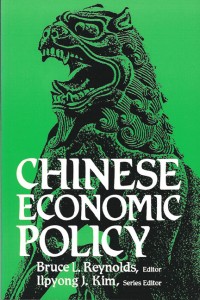Will the United States Collapse or Decentralize?
I wonder whether the United States will act like a big bubble with its elites clinging to power and collapse like the Roman Empire, or eventually rise to the challenge and transform itself, decentralizing and seeking constructive social solutions like China since the rule of Deng Xiaoping.
This week, in a class I am teaching, we talked about whether the centralizing tendencies in the US economy and government can be reversed. There are a growing number of populist movements, left and right, that feel the loss of community and the destructiveness of corruption in both centralized corporations and governments. They have a nostalgia for the old life in the small town, where people took care of themselves and a highway was their only involvement with a state.
Let’s start by asking whether we could revert to small towns, and whether there would be a social consciousness to do so. The United States is much more populated than at the time of the founders, and there is probably not enough land for everyone to have a subsistence farm. Jefferson believed that the experiment he helped set in motion was basically good as long as people were rural, and told Madison that “when people pile up in cities as in Europe, they will become corrupt as in Europe.” Hamilton wanted to create higher-order social institutions like national banks and a stock exchange.
Singapore, a highly populated city-state, seems to be an example of where dense population exists with a social consciousness that created the social institutions that make it possible for 70% of its people to live above the U.S. poverty index. Yet, this does not necessarily translate into happiness, which is a much debated topic. Guatemala, with a low per capita income and more rural life, on the other hand, also ranks high on a number of happiness scales.
The United States might not be able to revert to subsistence farms, but it may be able to revert to smaller towns. The problem with centralizing tendencies is that larger cities and governments often grow at the expense of smaller ones. Bigger social units have stronger lobbies, and in my state (Minnesota) people in rural areas are being taxed to pay for rail and schools in the cities, giving them less money to pay for infrastructure in their own towns. Recent studies on the level of personal freedom in the 50 US states partially correlate with the degree of urbanization.
We remember the saying “all roads lead to Rome,” which has descended from the days this same phenomenon took place in ancient Rome. Rome’s collapse was followed by descendants of the middle classes becoming serfs. Education was largely reduced, books burned, and a culture created that supported feudalism based on the church dogma that you got a better life in the next world.
China has recently worked at decentralization and has decentralized its tax structure. All personal income tax and welfare has been devolved to subnational units, creating more of a “union of states,” and competition between states. It is more of a multi-polar structure like the US founders envisioned with 13 sovereign states, than what we have in the US today, which has federal income taxes and now federal health care. China’s tax system is better suited to the appropriate level of governance than the US, but could probably be yet more devolved. This structure is, in my opinion, related to China’s economic growth since these reforms took place.
The transformation in contemporary China offers a counter-example to the collapse of the Roman Empire. It reflects a higher level of social consciousness and places great importance on education. It is also interesting that this transformation has occurred within the ruling party without a revolution of the sort we witness in the Middle East today.
It would be useful to study how the US government and its various social departments might be devolved, or partially devolved. The federal tax structure has an important impact on what local and state governments are actually able to do. If all of one’s taxes go to the central government, it is harder to take local responsibility than if the taxes were collected in a more decentralized manner, and could be managed more locally.
Transformation of society that rewards decentralization without a complete social collapse is a real challenge. I am a bit skeptical about whether this could change just by creating alternative lower level communities, like many are trying to develop. Changes might need to go hand in hand with demands that Washington devolve much of its power to lower levels, by devolving some of the tax revenue so that lower-level governments can be more self-sustainable and less dependent on Washington.
I know some US experts that helped advise China’s decentralization, but I do not think they have much an ear in Washington at the present time. China was desperately seeking real answers because they were in such bad shape. American leaders have not yet entered that level of seriousness; and most discourse is based on rhetoric and rationalizations to support one interest or another that contributes to political campaign funds.
In some ways, the cultural climate in the US today compares to ancient Athens before Socrates. That was an advanced, pluralistic, and morally relative society, whose policies were shaped by the art of rhetoric. Socrates was put to death as a crazy man for criticizing the rhetoricians and advocating honesty and virtue. Many Chinese (within the ruling party) have paid a price for the changes that have occurred, moving from politically popular slogans to honest economic science.
In the United States, both the anti-big government Tea Party on the Right and the anti-big corporation economic democracy movements like those following David C. Korten on the left have more in common that they might realize. Perhaps this is why Ron Paul (right) and Dennis Kucinich (left) both frequently vote against the same on large wasteful bills in Congress. It will be interesting to see if decentralizers in both parties can cooperate in order to stabilize out-of-control government growth. If the Democratic Party develops its counterpart to the Tea Party, which now has a strong impact on the Republican Party, it might be possible to devolve more social responsibility to lower levels of society and once again put the US on a sustainable course.




A discussion could be started about the decentralization of the fiscal structure of America. Blocks of states would be organized along the existing borders that make up the Federal Banking districts. Thus, blocks of states would work together that would take into account their regional characteristics. This would be a fundamental shift away from the central control in Washington D.C.
Washington has incrementally come to resemble the economic command structure of former communist and socialist countries.
As evidenced by the recent fiscal crisis of 2008 and the economic downturn in Europe, central command economies are too vulnerable to the failure of centralized economic authorities. The best example of this failure was the collapse of the former Soviet Union. As it seems the Chinese economists and politburo are not blind to the lessons taught by the Russian experience. Recent economic gains made by the Chinese can be attributed to regional economic entrepreneurship and decentralized fiscal controls. At the same time they are extremely wary of the economic troubles that are happening in the US and EU. Unfortunately, Congress is dragging its feet on real economic revitalization, decentralization and reform. In fact Congress has become much like the shrinking American middle class that is living from paycheck to paycheck.
we as a nation have come to far to fast. we lost our way not just with religion but our since of basic moral value. this generations offspring will be the finale straw as there is no moral fiber and no real ethics as a whole. be it due to bad parenting, no parenting or older teenagers seeing what is going on with the borrowing of the federal system and the amount of bailouts they get to see make them have no since of value. i wish this wasn’t true but i believe this is but part of what will move the united states to a breakdown and a break up of the basic structure that has served as the basis of the united states. prove me wrong
tell me what is there to moderate in my post. there is nothing in the page about violence, the take over or overthrow of our society nor a word of racism. my post was of a parent of 5 and all having two parents in a middle class home and experiencing what we all are seeing daily. moderate all forms comments as the written word printed will only be allowed by the group that allows it to be printed. live free and live without the support of others as one can only rely on ones self then of others
i would also think who ever runs this forum also believes social security is an entitlement from the federal government.